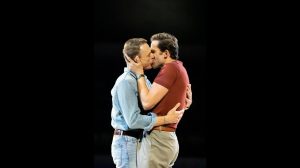Powerful performances from Okonedo & Daniels

★★★★
You may well be familiar with the horror story of Medea. It began as an Ancient Greek myth and was immortalised in a play by Euripides. In this review, I’ll be talking about how it ends. If you don’t know, and want to have the extra tension of wondering whether or not she will commit the terrible act of violence that is threatened from the beginning, you may want to stop reading. Although, if you do, you’ll miss me talking about a stunning theatre production featuring Sophie Okonedo and Ben Daniels giving two of the most powerful performances I’ve seen.
In Euripides’ version of the myth, Medea kills her children as an act of vengeance against her husband who has left her for a richer, more influential and younger woman. Stories of parents murdering their children make headlines to this day, and no doubt such an act was just as shocking to the Ancient Greeks. But what Euripides does, while not in any way whitewashing the monstrosity of the act, is to lay out everything that led to it.
Unlike the other ancient classic currently gracing the London stage, namely Phaedra at the National which I saw and enjoyed last week, this production makes no attempt to modernise the story. Yes, the characters wear modern dress but it’s fairly plain, and the set, designed by Vicki Mortimer, is almost bare. Such details as there are, are telling– a low wall concealing a staircase to a basement (where the final horrors take place) is made of stone (a word that is used frequently in the play to describe Medea); high above hangs a giant golden headband or crown which parallels the circular stage and predicts the headband that is weaponised later in the play. Even a table and chairs which could denote the possibility of sitting and talking things through are removed before a word is spoken.
And this is all happening in the round, at the wonderful new theatre @sohoplace. So it’s like being in an Ancient Greek amphitheatre, where the audience was all around, drawn into the play and treated as witnesses and judges. Even more so, because no-one is more than a few rows from the actors. In fact, the chorus of three women sits among the audience, making us all feel like we’re the women of Corinth trying in vain to understand and intervene.
Even the adaptation is a classic, the 1947 version by American poet Robinson Jeffers, which has both the natural flow of modern English and an accentuated use of metaphor. ‘Stone’, ‘bone’ and ‘dog’ run like a motifs through the play.
Medea has been wronged and she wants revenge. She played a major part in the success of her husband Jason (of Argonaut and Golden Fleece fame) only for him to betray her by leaving her for the daughter of Creon, the King of Corinth . The play is a series of ‘interviews’ between Medea and the powerful men in her life: Creon, Aegheus the King of Athens, and of course Jason.
From the very beginning of Robinson Jeffers’ adaptation, Medea is full-on angry and prepared to be as evil as required in response to the perceived evil of Jason and of the male-controlled society that has demeaned her. And what this means is that Sophie Okonedo can let rip with her anger and her anguish from the start.
Euripides’ explanation, Daniels’ provocation, Okonedo’s persuasion
I guarantee you will rarely have seen a performance like that of Sophie Okonedo as Medea. She’s mad with anger, yet able to outargue and deceive these men with smiles and guile. She cries proper snotty tears, she smiles like a tiger, her eyes turn to stone, all in a minute. You may know what’s going to happen, but the tension is palpable, because, even when given an out, the men patronise her, and, even though they know she is to be feared, underestimate her.
As modern people, we are more into the idea of atonement and forgiveness but we understand the visceral need for revenge, and while we may not see it as noble in the way the Greeks did, this play helps us comprehend why Medea feels she has no alternative but to carry out her gruesome vengeance and we feel her heart breaking at the thought of it.

In an astonishing piece of theatre, director Dominic Cooke has one actor Ben Daniels play all the male parts, thus emphasising that it is men generically who rule society. Even so, Mr Daniels, in a performance as powerful as Miss Okenedo’s, gives each of them a distinct personality: the selfish Jason, the weak King Creon, the shallow King Aegheus. And he constantly walks round the edge of the stage, usually in slow motion, showing she is encircled and trapped by men who disrespect Medea and take all chance of justice away from her.
The panic of the women around Medea, especially Marion Bailey as the Nurse, piles on the stress.
This is a most tense and ultimately devastating 90 minutes. You don’t actually see any of the deaths but I can tell you the hairs on my neck stood up when Medea went down the stairs to kill her children.
And this is where it goes wrong as a play. It may, or may not, have worked for the ancient Greeks- but for a modern sensibility, murdering your children crosses a line, even with all of Euripides’ explanation, and Ben Daniels’ provocation, and Sophie Okonedo’s persuasion. It is too much like a terrorist justifying killing innocent people.
Medea can be seen at sohoplace theatre in London until 22 April 2023.
Paul paid for his ticket.
Click here to watch this review on the YouTube channel Theatre.Reviews With Paul Seven

